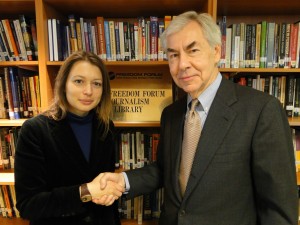Latvia to Host Baltic Investigative Reporting Center
Inga Springe sits down with Liga Ozolina of the EJO’s Latvian team to discuss the Baltic Investigative Reporting Center.

Inga Springe, Director of the Baltic Investigative Reporting Center & Ints Silins of the U.S. Baltic Foundation
On August 9, 2011, a group of journalists from Lithuania, Estonia, and the United States announced the creation of the first-ever Baltic Investigative Reporting Center, a non-profit organization based in Riga, Latvia, designed to preserve the integrity of investigative journalism. The announcement came as a breath of fresh air for those resigned to the fact that investigative journalism is an endangered discipline in the Baltics.
Inga Springe, who is director of the center in addition to working as a journalist and lecturer at the University of Latvia, discusses the institute’s development and ambitions with the EJO’s Latvian Editor, Liga Ozolina.
Q: Where did you get the idea for the creation of the Baltic Investigative Reporting Center?
The idea came from the United States, where investigative journalism is mainly held within similar nonprofit organizations. One year ago, through the Fulbright/Humphrey Fellowship Program, I was given the opportunity to improve my professional skills in the United States. By that time I had resigned from my job at one of the largest daily newspapers in Latvia, Diena. While I didn’t know what my future held, I knew I didn’t want to work at a weekly magazine or for a daily newspaper anymore. At the same time I knew I couldn’t leave journalism completely. I was in the U.S. when some former colleagues came up with the idea to establish a nonprofit media center in Latvia. I decided to research the idea by attending conferences and reviewing the practices of The Washington Post and one of the oldest and largest non-profit investigative news organizations, The Center for Public Integrity, in order to gain a better understanding of developing trends in investigative journalism.
I also visited some of the most important non-profit media organizations in the U.S., among them ProPublica, which has twice been awarded the Pulitzer Prize. I was fortunate enough to meet Kristine Rizga, a Latvian journalist who lived in the United States for 10 years and worked for several non-profit media projects. She provided me with a great deal of support by helping to edit my writing while also offering emotional encouragement. As I continued to meet more journalists considered to be experts in non-profit investigative journalism, I became immersed in the idea of creating a center. I began to realize that in times like these, when journalistic news is decreasing in scope and frequency, such centers are integral in order to support the discipline. So I said, “Let’s try it in Latvia!”









